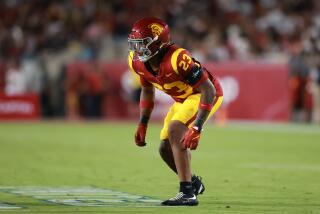Special Teams Have Flair for Dramatic
- Share via
At USC games, kickoffs and punts are no time to run to the concession stand.
Those are times to keep an eye on the players you might call the Trojans’ special forces.
They’re a gang of fast, aggressive, special-teams players who might commit an exasperating penalty one minute, but the next can turn a game on its head with a blocked kick or a spectacular kickoff or punt return.
The renewed emphasis on special teams under Coach Paul Hackett and assistant Shawn Slocum is paying off for USC, a team winning the sort of games it might have lost a season ago.
Already, USC has blocked five kicks in five games, and special teams have accounted for four touchdowns--providing a much-needed scoring injection for an unsteady offense that can thank the special teams and defense for scoring a third of USC’s 18 touchdowns.
“Our special teams already have been responsible for four touchdowns,” Hackett said. “We need to keep it up if we intend to have the kind of season we’re looking for.”
It started with Chad Morton’s 98-yard kickoff return against Purdue, picked up speed with R. Jay Soward’s 74-yard punt return against San Diego State, and began to get really interesting when Rashard Cook recovered Danny Bravo’s blocked punt in the end zone against Oregon State.
On Saturday, Ifeanyi Ohalete helped USC come from behind in the fourth quarter for a 35-24 victory over Arizona State when he returned Antuan Simmons’ blocked punt for a touchdown and the Trojans’ first lead of the game.
It was Simmons’ second block of the season, by the way. He also blocked a field-goal try by Purdue. All told, USC has blocked three punts--returning two for touchdowns--and two field-goal kicks.
“Antuan has a great ability to key on the ball and get upfield,” Slocum said. “When the ball moves, he’s moving. Some guys, the ball moves, then they move.”
Slocum’s indoctrination as a special teams expert began when he was a player at Texas A&M;, where his father, R.C. Slocum, is the coach.
“Unfortunately, I wasn’t a Chris Claiborne,” Slocum, who also coaches USC’s linebackers, said with a laugh. “I was scrambling just to get on the field.”
He became a special-teams player, and his father advised him that making special teams an area of expertise could help him on the way up the coaching ladder.
Slocum was a graduate assistant under Hackett at Pitt in 1990 when a coach named Scott O’Brien, who now handles the Baltimore Ravens’ special teams, broke him in, without an invitation.
“At 6 a.m., he’d make me repeat verbatim the things he taught about special teams,” Slocum said. “If I said something wrong, he’d come unglued.
“I was thinking, ‘What in the world? I want to be a defensive coach, not worry about the kicking game.’
“One day it struck me like a brick on the side of the head that what he was doing was helping me.”
Slocum returned to Texas A&M; and spent the next seven years coaching under his father, handling the special teams the last six.
When Hackett was hired, he immediately sought out Slocum to shore up USC’s special teams--and the kicking game became something USC works on at length at the beginning of practice, not as an afterthought at the end.
But even with all the emphasis, things get a little hairy sometimes. There’s been no shortage of mistakes.
“It’s frustrating at times, but it’s the nature of the beast,” Slocum said. “What special teams is, is an exchange of possession in the open field. There are a lot of variables.”
Kicker Adam Abrams went through a brief but brutal slump against San Diego State, when he missed three field goals. But he recovered and kicked four against Oregon State, then drilled a career-long 49-yarder against Florida State.
Punter Mike MacGillivray, a redshirt freshman, is doing the job despite some early doubts, though he could be more consistent.
There’s the occasional embarrassment of a long return--Oregon State’s Tim Alexander returned a kickoff 100 yards for a touchdown.
And then there are the penalties, some of them the results of being too aggressive--and some that have called back big returns.
“Some of the penalties in the kicking game, I call aggressive penalties--like two illegal blocks in the back and a hold,” Slocum said. “I want the players to be aggressive, but we can’t make foolish penalties.
“But delay of game on a kickoff or a kickoff out of bounds, that should not occur.”
It’s not the little penalties, but the big scoring plays people remember.
“The kids are really focusing and concentrating now,” Slocum said.
“The whole team now looks for something to happen in the kicking game.”
More to Read
Fight on! Are you a true Trojans fan?
Get our Times of Troy newsletter for USC insights, news and much more.
You may occasionally receive promotional content from the Los Angeles Times.






